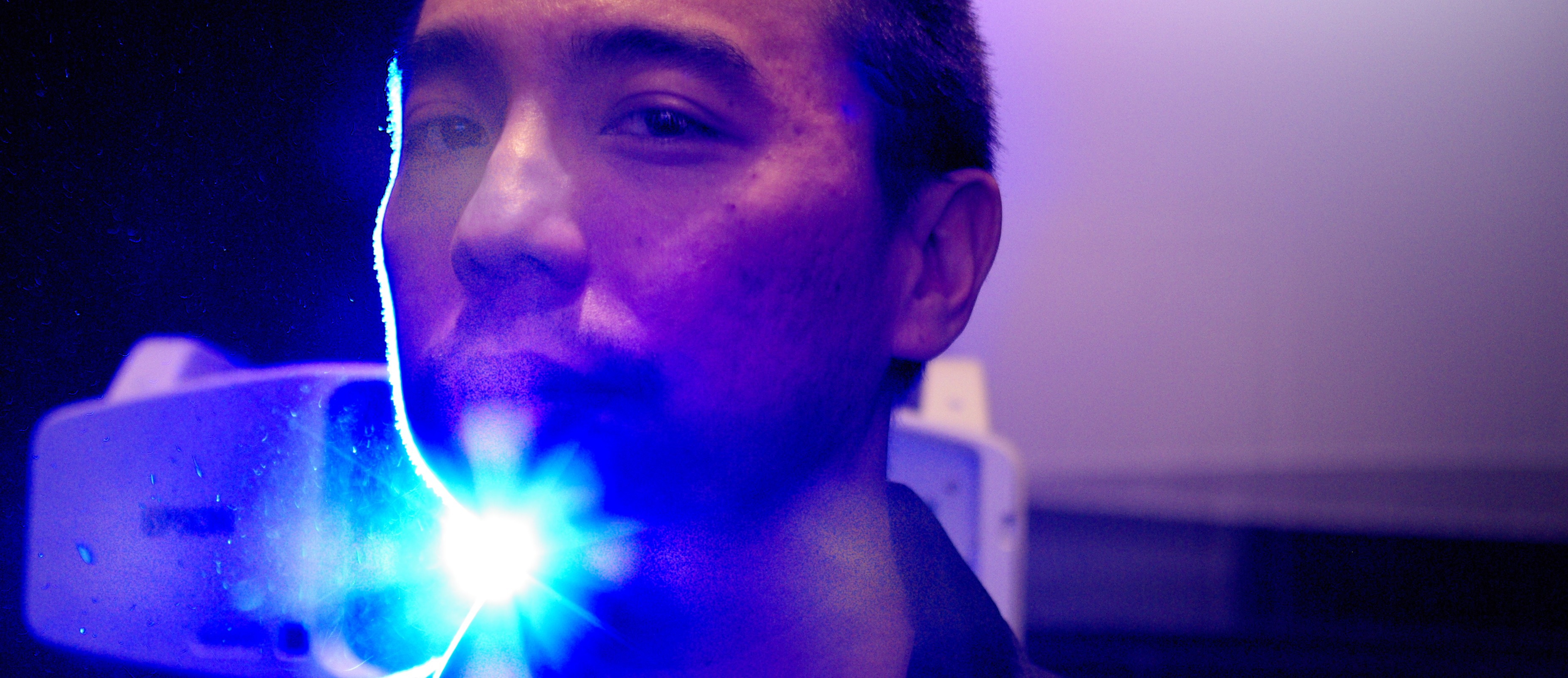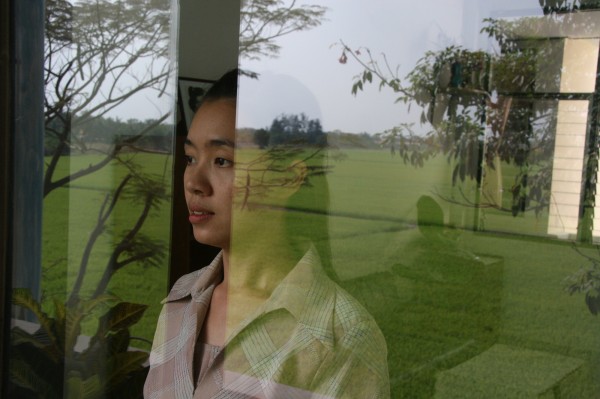Film fra Sør 2013: Den thailandske filmskaperen Apichatpong Weerasethakul er æresgjest under årets Film fra Sør, der han mottok prisen Silver Mirror Honorary Award under festivalåpningen. Et utvalg av filmene hans vises under festivalen, deriblant Gullpalme-vinneren Onkel Boonmee som kan erindre sine tidligere liv (2010). I tillegg åpnet Apichatpong-utstillingen Photophobia på Stenersenmuseet forrige uke, som blir stående til midten av desember.
Sveinung Wålengen (SW), redaksjonsmedlem i Montages, møtte Apichatpong for en samtale på en kafé like ved Stenersenmuseet, rett etter at kunstneren hadde guidet publikum gjennom sin egen utstilling. Etter noen innholdsrike dager var den sympatiske æresgjesten heldigvis ikke lei av å snakke om kunsten, tiden og livet; over en croissant og en kopp med te. Samtalen er gjengitt på engelsk.
*
SW: You just finished guiding an audience through your own exhibition, which contains video installations, short films and photographs. With all these mediums, how do you choose the right one for a subject you want to explore?
Apichatpong Weerasethakul (AW): Well, it’s always a pleasure for me to try different gadgets. From the Super 8 camera to really small digital cameras. I feel like a kid exploring all this, it’s still like magic to me. For example, for Cactus River I used a very small camera that record low resolution film and sound, and it affects the way I move the camera and my distance to the subject. So I think the film itself becomes the manifestation of the medium, not only just telling a story.
SW: In a way, it feels like you are more concerned about politics and storytelling in your installations, than in your feature films. Wouldn’t a movie be a stronger medium for this, reaching out for a bigger audience?
AW: Yeah, you made an interesting point. For me, film is a different kind of expression than books or text, which is more two-dimensional. Film involves time. There are many books about political situations. There is no use to make films like that. So maybe in a two-dimensional printing or photograph I become less conscious about the medium and more obvious about the political expression.
SW: After you won the Palme d’Or in Cannes for Uncle Boonmee, you have continued making short films and video installations, and taking photographs. Many award winners from Cannes use the prize to get a new feature film project realized. You haven’t. Why?
AW: After winning the palm for Uncle Boonmee, I spent a whole year travelling. I mean, not travelling for fun, but for the film. So I’ve been to many places to meet distributors, to meet the audience, and for me it’s been an amazing experience to finally see people willing to buy the film! But anyway, during the process there have been many things that have opened doors to visual arts too, which I have been working with for a long time. So the palm from Cannes actually affected the visual arts element. It made me more active.
SW: As an artist in general.
AW: Yes. It is almost like a gift to myself. Now I can relax while doing my work and experiment.
SW: I remember reading about a feature film project called Cemetery of Kings. Will this still be made?
AW: We will shoot it around next year, some time in September. Again it is a portrait of Jenjira (Pongpas) in this small town, where there is a sleeping sickness going on. She takes care of a sleeping soldier – the guy from Tropical Malady – and she starts to feel affection for him, but at the same time she is married to her American husband. The movie focuses on dreams she and the soldier have together. They share dreams.
SW: They meet in their dreams?
AW: Yeah, yeah. But they’ve also met in real life. I’m still developing the movie, but I think the dreams will be quite a mixture of fiction and non-fiction, and politics.
SW: Are the dream sequences filmed with a different camera or different lenses than in the sequences from real life?
AW: No, it’s the same. You don’t even know it’s a dream.
SW: When you received your prize of honor at the festival opening here in Oslo, you mentioned Steven Spielberg as an influence. Do you share his fascination for magic and mysteries, which appears especially in his earliest films? E.T. (1982), for example?
AW: Yes. They were very emotional experiences. I am aware that my movies and his movies are very opposite, but somehow I think it was a big influence there. Definitely also from many VHS’s I grew up with; American B-movies, horrors, slashers. There is an attraction for teenagers in this fantasy and fear, which I liked. I think the horror genre is the most attractive and mysterious form to manifest the power of movies for kids. That’s why it had a deep influence on me, it came from the interest of the medium itself.
Then I started to watch European movies, like Fellini and Godard, that I didn’t understand. But I loved the fact that I didn’t understand them, so I watched them again.
SW: What about Michelangelo Antonioni, another important European director? His exploration of time and movement, and the way his films feels both very realistic and spiritual, is in some way reminiscent of what you explore in your movies.
AW: In fact, I am not so much influenced by him, because I didn’t have the chance to see his films until later. The first one I saw was Blow-Up and I remember I didn’t like it, except from the end with the imaginary tennis. The problem is that I like to see film as film, so I refuse to get DVDs and miss so many classics. But I just saw The Passenger last year. It was really, really amazing.
SW: The last scene, the one-take… Do you remember?
AW: Yeah, when they go out of the room.
SW: Yes. It’s something there I haven’t thought about before you mentioned the film now, but the way the camera records death in that last sequence… In different interviews you have mentioned your interest in the connection of death and the death of cinema.
AW: For me, it’s not really death, but transformation of cinema I’m curious about. The way it is able to mimic the transformation itself in life. That’s why I liked The Passenger in the way that the movie doesn’t have many very clear structures. It just goes and somehow I feel that the movie is presenting this kind of fragility of life, it has no form and is constantly transforming. I like playing with the motion in movies. Suddenly it can stop in the middle and take a different form in the second half.
SW: To play with motion and time, is this something you feel is specific for cinema, or do you explore it in an equal way in your photographs or video installations?
AW: I would say that I do, it’s all about a simulation of life and certain feelings. But at the same time I ask myself like many filmmakers, “is there a point in making movies?” Why are you suffering to make movies, especially this kind of movies, which are very time consuming and have no reward? Except from some awards, of course, which makes you happy, but during the making and planning there’s no gain. So you have to ask yourself how old you are, how much money you make, why you are continuing to do this. One of the answers is also that making movies is very superficial – to create a world and play with it.
So I’m still on that journey, trying to find the meaning in making movies. I’m also trying to understand myself trough Buddhism and meditation. Meditation is really about self, and knowing the causes of happiness, suffering, attachment. A human being is like a moving camera, recording all the time. I make movies because I forget, so I just repeat the experience, that’s all. That’s why I say «superficial». Buddhism somehow make you realize that you don’t need cinema, it’s a present moment there that you can enjoy.
SW: But cinema can also make you appreciate real things and moments even more, in a way the camera can isolate an object and make you more conscious about it, and then become more conscious about it in real life.
AW: Yes, but if you appreciate life, you don’t need cinema. You don’t need someone to tell you this, you don’t need to focus. So I have this conflicting philosophy – is making movies worth it or is it just leaping? There’s a word from Jane Goodall, she said that she don’t keep diaries, she just lives her life. It had a big impact on me.
SW: It’s like when people are on vacation and just taking pictures all the time, or thinking about the next thing they can photograph, instead of appreciate the moment itself. But maybe it is a human necessity, because you can’t fight time and therefore you are trying to capture it.
AW: I think when you are about to die, you will think “did I live my life or just making stupid movies?”
SW: Probably. So, let’s go back to what you mentioned about watching films as film. You prefer to watch films in cinemas?
AW: Yes, as it is intended. Because from a filmmaker’s perspective you spend so much time designing image and sound.
SW: In Norway, many of the cinematheques that are screening older films and arthouse films have been forced to close, because of a lack of financing. Also, the variety of distributed films as a whole is threatened.
AW: I also think it has something to do with the audience. They don’t go to the cinemas, there’s no driving force.
SW: Yes, but this has actually not been an argument for closing the cinematheques in Norway. It’s a question about the financial responsibility. But of course it is also implying a question about interest from the audience.
AW: I was in Japan a few years back and went to a place called Image Forum. This is a place for cutting edge films, experimental cinema. I asked them “how do you survive”, and they said they sell a lot of DVD’s. But they also said that the good business for them is that the screenings now are during the daytime and the weekdays, instead of the weekends like it was before. This is because the audience is the same as back then, and now they have time to go during the daytime and weekdays. The new generation doesn’t go to the screenings.
SW: That’s not a good sign for cinema. But for a while now, you have experienced a film-interested crowd here in Norway during the festival. What do you think about Norwegian culture, after your first visit to Norway?
AW: If what I have been told is right, you are very private and like to stay in your houses. That’s me! Guiding my own exhibition is something new to me, but I’ve been comfortable with it, because it is about cinema. Movies make me functional, it is a buffer which makes me braver.
*




